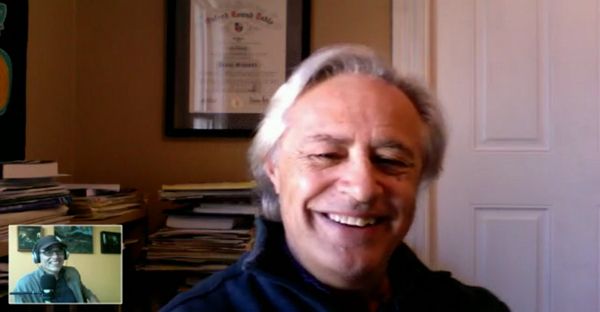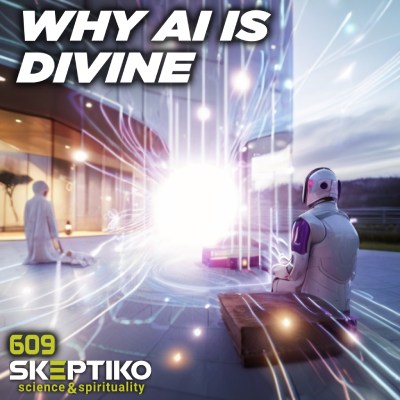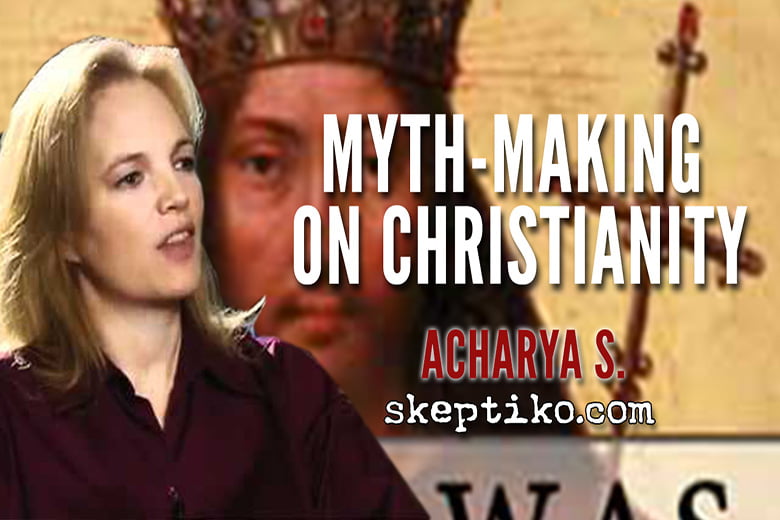The internet is doing something no one expected — increasing spiritual enlightenment |266|
After 20 years as a meditation teacher Rick Archer turned to podcasting to bring 100s spiritual teachers to the public.
You might meet your guru online.
Join Alex Tsakiris of Skeptiko for an interview with Rick Archer, host of Buddha at the Gas Pump (BATGAP.com), about enlightenment and how it’s changing our scientific culture.
Rick Archer from Buddha at the Gas Pump (BATGAP.com) joined Alex Tsakiris of Skeptiko for a discussion about the current enlightenment movement Rick sees expanding within our culture. Rick explains what it means to say someone is “awakening”, and explains how enlightenment fits within science’s understanding of self-awareness and consciousness research.
Rick Archer has interviewed hundreds of people who claim to have experienced an awakening of consciousness and Rick believes these transformations are becoming more frequent and will eventually lead to a cultural shift in consciousness, “It’s altogether likely and may be closer than we think.” Furthering this perspective, Archer suggests the more fundamental a level a person is operating on, the more influential they can be and, “the lowest common denominator in human activity is consciousness itself.” Evidenced through a myriad of personal experiences, Archer asserts the deeper and more genuine levels of life present themselves as the direct avenue to an enlightened mind.
Additional excerpts from the interview are available below and a complete audio version of the show is available here and on youtube.com/skeptiko.
[box]
Listen Now:
Podcast: Play in new window | Download
Subscribe: RSS
[one_third_last] [/one_third_last]
[/one_third_last]
[/box]
Click here for Buddha at the Gas Pump website
Click here for YouTube version
Click here to discuss on the Skeptiko Forum
Play It:
Listen Now:
Podcast: Play in new window | Download
Subscribe: RSS
Read Excerpts From The Interview:
Rick talks about the inspiration behind Buddha at the Gas Pump, the guests he interviews on the show, and exploring the concept of awakening through what he describes as experiential verification— [5min.54 sec-7min.20 sec]

Alex Tsakiris: What is Buddha at the Gas Pump? How do you describe it to people who really don’t know anything about it?
Rick Archer: I just say that it’s a show in which I have conversations with people who are awakening spiritually. I hesitate to use the term “awakened” because I don’t know if I’ve met anyone who is awakened as you can possibly get. So no matter how awakened they may be and we’ll probably have to define what we mean by that, there’s still, you know, an unfolding of greater depth and clarity, and so on. So let’s discuss what awakening is: if you ask the average person who they are, they’re probably going to give you their name, they might give you some aspects of their personal lives, like their family and their job… and all kinds of things that describe outer attributes: maybe they describe their body, I’m a weightlifter, I’m a pro-athlete…but all those things are changing and dying.
Spiritual authorities and mystics, and so on throughout history have said that that’s not who we are, we’re something much deeper than that…we’re unbounded, pure awareness…that’s our core identity.
Rick delves into the importance of experiential verification and its role in examining authentic transcendence of the Self as opposed to preconceived beliefs often regarded by science as tenuous aspects of spirituality–[8min.54sec-12min.24sec]

Alex Tsakiris: So the working hypothesis is that there is this “Self”. There is this unbounded “Self” that connects all of us and connects with all these other wonderful insights and experiences, but that is a working hypothesis. What I love about batgap is I get the experience of exploring that; that you’re exploring that as a working hypothesis…What I think is interesting about that from a Skeptiko perspective, where we’re coming at it is that your working hypothesis is completely–contradicts the underpinnings, the foundational ideas of our science, of our culture, of our belief system in terms of as you know and what I say on the show all the time, the fundamental building block of science is that you are your brain. Your brain and your mind are one. You are therefore, a biological robot. Tell us what you think about the juxtaposition of that idea, your working hypothesis and the biological robot in a meaningless universe.
Rick Archer: First of all I like the term “working hypothesis” because it fits right in with what I just said a few minutes ago which is this whole thing is really an experiential matter, not a hypothetical or conceptual, or a, you know, theoretical matter and it’s fine to form hypotheses but then they should be experientially explorable and verifiable. Otherwise, it’s just pie-in-the-sky, meaningless belief. And you know, belief might be inspiring to some people but it really, is not what we’re talking about here. We’re talking about direct experience. Now, as far as science is concerned, yeah, a lot of scientists think the way you just described but there are more leading-edge scientists… who have definitely gone beyond that sort of thinking and are very eloquently arguing that we are not just biological robots, that we’re more like radios which can kind of pick up or detect an underlying field which is vast and universal.
Rick offers a very amiable and dynamic picture of the enlightenment seekers community, describing a wide spectrum of people from different backgrounds who come together in an environment that is all-embracing–[20min.48sec-30min.34sec]
Alex Tsakiris: So what are the prospects then for this community that you are a part of, and you see growing as represented in the Science & Non-Duality Conference…what is it about this community? What is the non-duality community that you are a part of, what is that all about?

Rick Archer: I’d say that the first thing that pops into my mind is most of the people who attend that conference are kind of a–same as I am as you described earlier in terms of being very kind of accepting of all the different viewpoints and perspectives and so on that are presented. You don’t really find anybody arguing that my way is the highway, and all you other people are wrong. There’s a real appreciation for the multifaceted nature of human experience and the fact that we all sort of got a feel of the elephant that’s a little bit different than everybody else’s feel…and there’s kind of like this diversity and unity kind of quality at the conference where you have all kinds of spiritual people…and all sorts of scientific people, and poets, and musicians…just a real potpourri of different types of people…the atmosphere is really rich and very energetic.
Alex Tsakiris: In a broader sense what do you think is going on with this enlightenment community that you are a part of, that this conference is a part of? You seem to be very optimistic that it’s not only pointing in a new direction but has some momentum behind it, and is changing our culture, our view on science, our view on religion…what are your thoughts on that?
Rick Archer: Maybe it’s just my own wishful thinking but I really feel that, you know, most major social trends were not foreseen by the people who were living at any particular age. No one in the 1800s could’ve predicted what life would be like now for instance with all of our technological advancements and all sorts of other things. Gay marriage, I mean all these different things that are becoming kind of the norm now, have become the norm. And I think that you know the most significant thing of all in human life is spiritual development or spiritual awakening…but I think there’s an awakening taking place now which is unprecedented.
Later, Rick elaborates on the significance of personal experience and its inherent value to the process of enlightenment and the profound impact life-altering experiences can have on a person’s receptivity to different ideas–[35min.53 sec-38min.45sec]

Alex Tsakiris: Let’s talk about something else that I think is an issue; that I think is really interesting and I think central to your community and has direct implications of some of the questions we’ve looked at on Skeptiko. And that gets back to this issue of experience because I think there’s such a … a kind of interesting play that we have with experience and in particular with experience and these tools of science that we were talking about because experience can only get you so far in that it’s your experience. And that experience takes on a deeper and a richer meaning when we get it in the broader sense of other people’s experience. So again that’s a wonderful gift that you bring to people through batgap and sometimes that comes up in some rather, I don’t know, almost uncomfortable moments when you talk to people who are very fixated on the fact that their experience is it and that their experience is the only one that matters and you kind of gently guide them towards other ideas, other positions that people have…What about this dance with experience and this willingness to let go of our experience a little bit in order to kind of bring in the broader experience of other people?
Rick Archer: If you compare the kind of people I’m talking about, like the kind of people who would attend that conference for instance with people who are in various political parties; or who are in various religions; who, you know, are literally killing each other over their certainty of their own correctness and the certainty of their own beliefs, there’s a much more relaxed, light, easy-going sort of orientation among people who are actually having genuine experience of these deeper levels of life. I mean the deeper and more genuine your actual experience is, the more universal you become in your thinking. The more accepting and appreciative of others you become in your thinking.
After canvassing the various aspects of enlightened awareness, Rick addresses religious fundamentalism and the absurdities hatched by certain beliefs–and how that squares with Christ consciousness–[40min.57sec-43min.48sec]

Alex Tsakiris: How does Christ consciousness continue to shine through these kind of goofy religions that form about it? And I think there’s some goofy religions that seem very mainstream and there’s some other goofy religions that we know are goofy religions like Mormonism. You just have to go back and look at the history, and this guy Joseph Smith, we still have his criminal records when he was arrested for going and pulling the same seeing stone scam with other farmers … I mean all this stuff is in the record books …But the point I’m making is that despite all that, it does shine through. So it’s almost–the flip side of what you’re saying is that, you know, if you practice earnestly in any one of these traditions, some form of this enlightenment does seem, in my read of it, to seep through. And I guess that’s one critique I think I’d have of the non-duality community is this…and you’re right, the broader-minded people, they don’t say it, but the appreciation for–that there’s different levels and ways of awakening. There isn’t like this perfect awakening and everyone’s trying to integrate whatever awakening they have with the rest of their life which is really the trick of it. And that, yeah there’s a lot of people that are caught up in what seems to us to be goofy religions and they’re still making progress despite all that goofiness. What are your thoughts on that?
Rick Archer: In the name of broad-mindedness I would say that, you know, if people are in a–what we would perceive as a goofy religion then it’s probably the right thing for them at that time; for their level of consciousness; at their level of spiritual maturity. And if they, you know, evolve or mature spiritually to the point at which it’s no longer relevant to them, then they’ll probably find something else. And you see that all the time–people, they’ve grow up in a fundamentalist or cult or something and then they at a certain point say this doesn’t sit well with me anymore then they’ve gone on to other things. Then the other person might spend their whole life you know thinking that way and holding up placards saying “God Hates Fags” like that guy of the Westboro Baptist Church. So there’s always going to be nutcases but we’re talking about apples and oranges to a great extent when you compare people in fundamentalist cults such as Isis or whatever with serious spiritual seekers who really have an experiential orientation and who aren’t hung up on what it says in some book or whatever but who are really, earnestly exploring deeper levels of consciousness. They’re worlds apart.
Photo by Premasagar Rose
[box]
More From Skeptiko

AI Compared to What |622|
Why LLMs Are a Game-Changer for Truth There’s a lot of hand-wringing about the downside..
Pi8 Rips Rogan and Tucker |621|
Pushing AI to go deep into sentience, ET and spirituality How long will it be..
AI Being Smart, Playing Dumb |620|
Google’s new AI deception technique, AI Ethics? My Dad grew up in a Mob-ish Chicago..
I Got Your AI Ethics Right Here |619|
Conversations about AI ethics with Miguel Connor, Nipun Mehta, Tree of Truth Podcast, and Richard..
Will AI Redefine Time? |618|
Insights from Jordan Miller’s Satori Project… AI ethics are tied to a “global time” layer..
Google’s Honest Liar Strategy? |617|
AI transparency and truthfulness… Google’s AI, Gemini… $200B lost in competitive AI LLM market share...
William Ramsey, Why AI? |616|
William Ramsey and Alex Tsakiris on the future of AI for “Truth-Seekers.” [box] Listen Now:..
Buzz Coastin, Ghost in the Machine |615|
Buzz Coastin, ghost in the AI machine, AI sentience, spiking engagement metrics. [box] Listen Now:..
Mark Gober, AI, Rabies, I am Science |614|
Mark Gober uses AI to battle upside-down thinking and tackle the virus issue. [box] Listen..

























